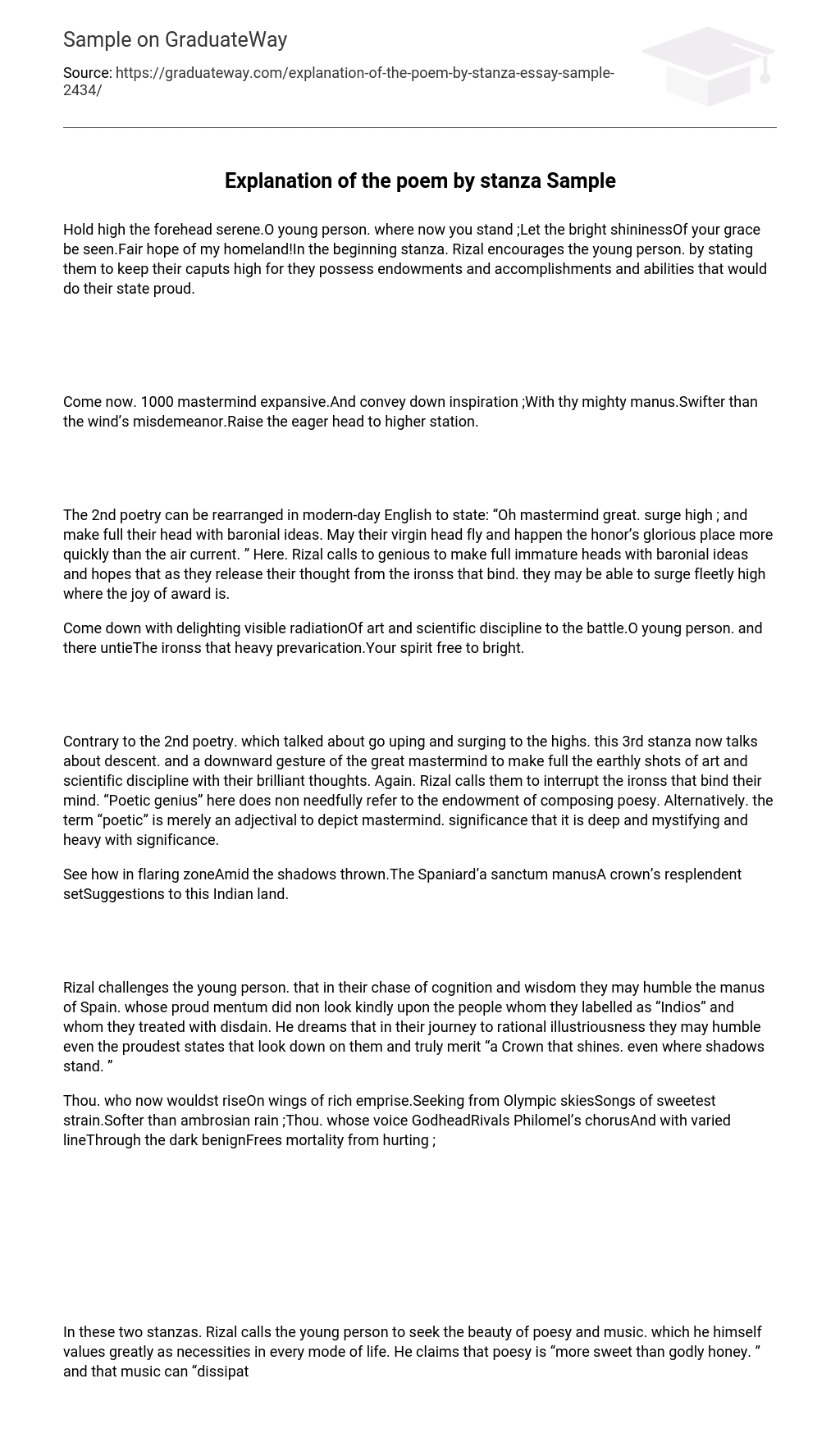Hold high the forehead serene.O young person. where now you stand ;Let the bright shininessOf your grace be seen.Fair hope of my homeland!In the beginning stanza. Rizal encourages the young person. by stating them to keep their caputs high for they possess endowments and accomplishments and abilities that would do their state proud.
Come now. 1000 mastermind expansive.And convey down inspiration ;With thy mighty manus.Swifter than the wind’s misdemeanor.Raise the eager head to higher station.
The 2nd poetry can be rearranged in modern-day English to state: “Oh mastermind great. surge high ; and make full their head with baronial ideas. May their virgin head fly and happen the honor’s glorious place more quickly than the air current. ” Here. Rizal calls to genious to make full immature heads with baronial ideas and hopes that as they release their thought from the ironss that bind. they may be able to surge fleetly high where the joy of award is.
Come down with delighting visible radiationOf art and scientific discipline to the battle.O young person. and there untieThe ironss that heavy prevarication.Your spirit free to bright.
Contrary to the 2nd poetry. which talked about go uping and surging to the highs. this 3rd stanza now talks about descent. and a downward gesture of the great mastermind to make full the earthly shots of art and scientific discipline with their brilliant thoughts. Again. Rizal calls them to interrupt the ironss that bind their mind. “Poetic genius” here does non needfully refer to the endowment of composing poesy. Alternatively. the term “poetic” is merely an adjectival to depict mastermind. significance that it is deep and mystifying and heavy with significance.
See how in flaring zoneAmid the shadows thrown.The Spaniard’a sanctum manusA crown’s resplendent setSuggestions to this Indian land.
Rizal challenges the young person. that in their chase of cognition and wisdom they may humble the manus of Spain. whose proud mentum did non look kindly upon the people whom they labelled as “Indios” and whom they treated with disdain. He dreams that in their journey to rational illustriousness they may humble even the proudest states that look down on them and truly merit “a Crown that shines. even where shadows stand. ”
Thou. who now wouldst riseOn wings of rich emprise.Seeking from Olympic skiesSongs of sweetest strain.Softer than ambrosian rain ;Thou. whose voice GodheadRivals Philomel’s chorusAnd with varied lineThrough the dark benignFrees mortality from hurting ;
In these two stanzas. Rizal calls the young person to seek the beauty of poesy and music. which he himself values greatly as necessities in every mode of life. He claims that poesy is “more sweet than godly honey. ” and that music can “dissipate man’s sorrow’s blight. ”
Thou. who by crisp discordWakest thy head to life ;And the memory brightOf thy genius’ visible radiationMakest immortal in its strength ;
Talking to the young person. Rizal says that by the really impulse of their head. they are capable of conveying to life or inspiring even someting as lifeless and unmoving as a difficult stone. He continues to state that the young person is able. to commemorate their ideas and their words through the aid of great mastermind ( as he has done himself. This stanza can be arranged in a more modern-day English construction as follows: “You can inspire the difficult stone at the urge of your head ; and transform. with the great power of your head. the pure memory of great mastermind into immortality. ”
And 1000. in speech patterns clearOf Phoebus. to Apelles beloved ;Or by the brush’s charming artTakest from nature’s shop a portion.To fig it on the simple canvas’ length ;
Rizal here addresses the young person. comparing their abilities to a charming coppice that can capture even the most olympian positions and the most glorious appeals on a clean canvas.
Go Forth. and so the sacred fireOf thy mastermind to the laurel may draw a bead on ;To distribute around the celebrity.And in triumph acclamation.Through wider spheres the human name.Day. O happy twenty-four hours.Fair Filipinas. for thy land!So bless the Power to-dayThat places in thy mannerThis favour and this fortune expansive.
The last stanzas are a charge. pressing the young person to run. for a glorious Crown awaits them. The “sphere” here pertains to the universe. demoing that Rizal believed the Filipino young person is every bit superb as those in any other state. and is able to postulate with even the strongest powers if they merely set their head to doing most of what they already have.





